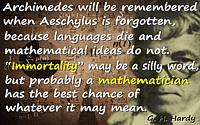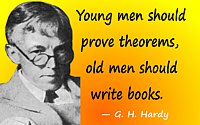 (source)
(source)
|
G. H. Hardy
(7 Feb 1877 - 1 Dec 1947)
English pure mathematician who made leading contributions in analysis and number theory.
|
G. H. Hardy Quotes on Work (9 quotes)
>> Click for 64 Science Quotes by G. H. Hardy
>> Click for G. H. Hardy Quotes on | Mathematician | Mathematics | Ramanujan_Srinivasa | Theorem |
>> Click for 64 Science Quotes by G. H. Hardy
>> Click for G. H. Hardy Quotes on | Mathematician | Mathematics | Ramanujan_Srinivasa | Theorem |
[I was advised] to read Jordan's 'Cours d'analyse'; and I shall never forget the astonishment with which I read that remarkable work, the first inspiration for so many mathematicians of my generation, and learnt for the first time as I read it what mathematics really meant.
— G. H. Hardy
In A Mathematician’s Apology (1940, reprint with Foreward by C.P. Snow 1992), 23.
A man who sets out to justify his existence and his activities has to distinguish two different questions. The first is whether the work which he does is worth doing; and the second is why he does it (whatever its value may be).
— G. H. Hardy
In A Mathematician's Apology (1940, 2012), 66.
A mathematician … has no material to work with but ideas, and so his patterns are likely to last longer, since ideas wear less with time than words.
— G. H. Hardy
In A Mathematician's Apology (1940, 2012), 84.
A painter makes patterns with shapes and colours, a poet with words. A painting may embody an “idea,” but the idea is usually commonplace and unimportant. In poetry, ideas count for a good deal more; but, as Housman insisted, the importance of ideas in poetry is habitually exaggerated. … The poverty of ideas seems hardly to affect the beauty of the verbal pattern. A mathematician, on the other hand, has no material to work with but ideas, and so his patterns are likely to last longer, since ideas wear less with time than words.
— G. H. Hardy
In A Mathematician’s Apology (1940, 2012), 84-85.
Good work is no done by “humble” men. It is one of the first duties of a professor, for example, in any subject, to exaggerate a little both the importance of his subject and his own importance in it. A man who is always asking “Is what I do worth while?” and “Am I the right person to do it?” will always be ineffective himself and a discouragement to others. He must shut his eyes a little and think a little more of his subject and himself than they deserve. This is not too difficult: it is harder not to make his subject and himself ridiculous by shutting his eyes too tightly.
— G. H. Hardy
In A Mathematician’s Apology (1940, 1967), 66.
If a man is in any sense a real mathematician, then it is a hundred to one that his mathematics will be far better than anything else he can do, and that it would be silly if he surrendered any decent opportunity of exercising his one talent in order to do undistinguished work in other fields. Such a sacrifice could be justified only by economic necessity of age.
— G. H. Hardy
In A Mathematician's Apology (1940, 2012), 70.
It is a melancholy experience for a professional mathematician to find him writing about mathematics. The function of a mathematician is to do something, to prove new theorems, to add to mathematics, and not to talk about what he or other mathematicians have done. Statesmen despise publicists, painters despise art-critics, and physiologists, physicists, or mathematicians have usually similar feelings; there is no scorn more profound, or on the whole more justifiable, than that of men who make for the men who explain. Exposition, criticism, appreciation, is work for second-rate minds.
— G. H. Hardy
In A Mathematician's Apology (1940, reprint with Foreward by C.P. Snow 1992), 61 (Hardy's opening lines after Snow's foreward).
No mathematician should ever allow him to forget that mathematics, more than any other art or science, is a young man's game. … Galois died at twenty-one, Abel at twenty-seven, Ramanujan at thirty-three, Riemann at forty. There have been men who have done great work later; … [but] I do not know of a single instance of a major mathematical advance initiated by a man past fifty. … A mathematician may still be competent enough at sixty, but it is useless to expect him to have original ideas.
— G. H. Hardy
In A Mathematician's Apology (1941, reprint with Foreward by C.P. Snow 1992), 70-71.
There is always more in one of Ramanujan’s formulae than meets the eye, as anyone who sets to work to verify those which look the easiest will soon discover. In some the interest lies very deep, in others comparatively near the surface; but there is not one which is not curious and entertaining.
— G. H. Hardy
Commenting on the formulae in the letters sent by Ramanujan from India, prior to going to England. Footnote in obituary notice by G.H. Hardy in the Proceedings of the London Mathematical Society (2) (1921), 19, xl—lviii. The same notice was printed, with slight changes, in the Proceedings of the Royal Society (A) (1921), 94, xiii—xxix. Reprinted in G.H. Hardy, P.V. Seshu Aiyar and B.M. Wilson (eds.) Collected Papers of Srinivasa Ramanujan (1927), xxi.
See also:
- 7 Feb - short biography, births, deaths and events on date of Hardy's birth.
- Godfrey Harold Hardy - context of quote Languages die and mathematical ideas do not - Medium image (500 x 350 px)
- Godfrey Harold Hardy - context of quote Languages die and mathematical ideas do not - Large image (800 x 600 px)
- Godfrey Harold Hardy - context of quote Young men should prove theorems, old men should write books. - Medium image (500 x 350 px)
- Godfrey Harold Hardy - context of quote Young men should prove theorems, old men should write books. - Large image (800 x 600 px)
- A Mathematician's Apology, by G. H. Hardy. - book suggestion.


 In science it often happens that scientists say, 'You know that's a really good argument; my position is mistaken,' and then they would actually change their minds and you never hear that old view from them again. They really do it. It doesn't happen as often as it should, because scientists are human and change is sometimes painful. But it happens every day. I cannot recall the last time something like that happened in politics or religion.
(1987) --
In science it often happens that scientists say, 'You know that's a really good argument; my position is mistaken,' and then they would actually change their minds and you never hear that old view from them again. They really do it. It doesn't happen as often as it should, because scientists are human and change is sometimes painful. But it happens every day. I cannot recall the last time something like that happened in politics or religion.
(1987) -- 


